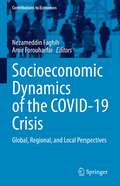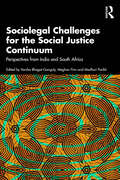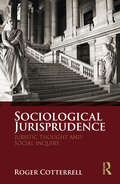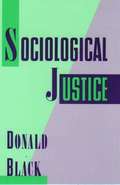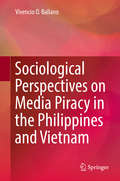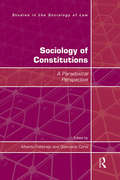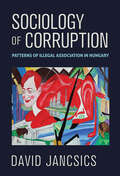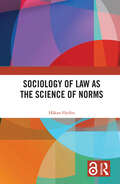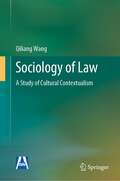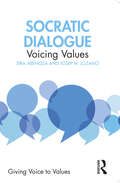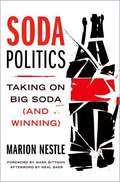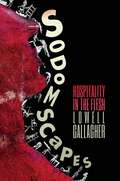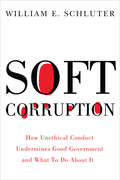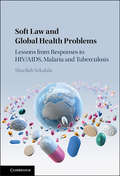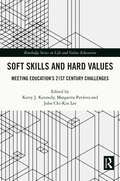- Table View
- List View
Socioeconomic Dynamics of the COVID-19 Crisis: Global, Regional, and Local Perspectives (Contributions to Economics)
by Nezameddin Faghih Amir ForouharfarThis book depicts and reveals the socioeconomic dynamics of the COVID-19 crisis, and its global, regional, and local perspectives. Explicitly interdisciplinary, this volume embraces a wide spectrum of topics across economics, business, public management, psychology, and public health. Written by global experts, each chapter offers a snapshot of an emerging aspect of the COVID-19 crisis for the benefit of academics and students, as well as the institutional, economic, social, and developmental policymakers and health practitioners on the ground.
Sociolegal Challenges for the Social Justice Continuum: Perspectives from India and South Africa
by Varsha Bhagat-Ganguly Meghan Finn Madhuri ParikhAs legal jurisdictions in the Global South, both India and South Africa have long histories of inequality and structural oppression. This book engages in comparative sociolegal analysis to examine the contours of social justice in both countries. It explores the role of law as an instrument for social change in the face of persistent conditions of injustice, discrimination, social exclusion, and socioeconomic vulnerabilities. The book addresses newly emerging socio-legal challenges for the social justice continuum in a neoliberal era. Focusing on four key themes, it explores:· the challenges for labour law and social security including informalisation, climate change, and migrancy;· law, technology, and social justice, with a focus on the role that emerging technologies often play to ameliorate or exacerbate social exclusion;· sexual orientation, gender, and substantive equality, grappling with the disjuncture between law and lived realities; and· pedagogical approaches to legal education and social justice lawyering.Lucid and illuminating, this book will be of interest to academics, researchers, legal practitioners and social actors who are exploring legal strategies and developments to tackle comparative social justice challenges, especially in the Global South.
Sociological Jurisprudence: Juristic Thought and Social Inquiry
by Roger CotterrellThis book presents a unified set of arguments about the nature of jurisprudence and its relation to the jurist’s role. It explores contemporary challenges that create a need for social scientific perspectives in jurisprudence, and it shows how sociological resources can and should be used in considering juristic issues. Its overall aim is to redefine the concept of sociological jurisprudence and outline a new agenda for this. Supporting this agenda, the book elaborates a distinctive juristic perspective that recognises law’s diversity of cultural meanings, its extending transnational reach, its responsibilities to reflect popular aspirations for justice and security, and its integrative tasks as a general resource of regulation for society as a whole and for the individuals who interact under law’s protection. Drawing on and extending the author’s previous work, the book will be essential reading for students, researchers and academics working in jurisprudence, law and society, socio-legal studies, sociology of law, and comparative legal studies.
Sociological Justice
by Donald BlackThat discrimination exists in courts of law is beyond dispute. In American murder cases, for instance, studies show that blacks who kill a white are much more likely to receive the death penalty than if they kill a black. Indeed, in Georgia, they are 30 times more likely to be condemned, and in Texas a staggering 90 times more likely. Conversely, in Texas, of 143 whites convicted of killing a black, only one was sentenced to die. But how extensive is discrimination in the courtroom? Is it strictly a matter of racial prejudice, or does it respond to a wide range of social factors? In Sociological Justice, eminent legal sociologist Donald Black challenges the conventional notion that law is primarily an affair of rules and that discrimination is an aberration. Law, he contends, is a social process in which bias is inherent. Indeed, Black goes well beyond the documented instances of racial discrimination to show how social status (regardless of race), the degree of intimacy (are they family members, friends, or complete strangers?), speech, organization, and numerous other factors all greatly influence whether a complaint will be filed in court, who will win, and what the punishment or other remedy will be. Moreover, he extends his analysis to include not only the litigants, but also the lawyers, the jurors, and the judge, describing how their social characteristics can also influence a case. Sociological Justice introduces a new field of legal scholarship that will have important consequences for the future of law: the sociology of the case. Black discusses how lawyers can use the sociology of the case to improve their practice and, for those interested in reform, he suggests ways to minimize bias in the courtroom. Beyond this, Black demonstrates that modern jurisprudence, with its assumption that like cases will be treated in like fashion, is out of touch with reality. He urges the adoption of a new sociological jurisprudence, with a new morality of law, that explicitly addresses the social relativity of justice. A major contribution to legal scholarship, this thought-provoking volume is essential reading for anyone interested in law and justice in modern society.
Sociological Perspectives on Media Piracy in the Philippines and Vietnam
by Vivencio O. BallanoThis book addresses the persistence of the optical media piracy trade in the Philippines and Vietnam. It goes beyond arguments of defective law enforcement and copyright legal systems by applying sociological perspectives to examine the socio-economic forces behind the advent of piracy in the region. Using documentary and ethnographic data, in addition to resistance and ecological theories in sociology of law and technology as the overall theoretical framework, the book investigates factors that contribute to this phenomenon and factors that impede the full formalization of the optical media trade in the two countries. These factors include the government's attitude towards the informal sector and strong resistance to tougher IPR protection, unstable and sometimes conflicting policies on technologies, burdensome business registration process and weak enforcement of business regulations, bureaucratic corruption and loopholes in law enforcement system as well as trade ties with China. In addition to that, the book highlights the social background of the actors behind the illegal business of counterfeit CDs and DVDs, thereby explaining the reasons they continue to persist in this type of trade. It invites policymakers, law enforcers, advocates of anti-piracy groups, and the general public to use a more holistic lens in understanding the persistence of copyright piracy in developing countries, shifting the blame from the moral defect of the traders to the current problematic copyright policy and enforcement structure, and the difficulty of crafting effective anti-piracy measures in a constantly evolving and advancing technological environment.
Sociology of Constitutions: A Paradoxical Perspective (Studies in the Sociology of Law)
by Giancarlo Corsi Alberto FebbrajoThis collection brings together some of the most influential sociologists of law to confront the challenges of current transnational constitutionalism. It shows the constitution appearing in a new light: no longer as an essential factor of unity and stabilisation but as a potential defence of pluralism and innovation. The first part of the book is devoted to the analysis of the concept of constitution, highlighting the elements that can contribute from a socio-legal perspective, to clarifying the principle meanings attributed to the constitution. The study goes on to analyse some concrete aspects of the functioning of constitutions in contemporary society. In applying Luhmann’s General Systems Theory to a comparative analysis of the concept of constitution, the work contributes to a better understanding of this traditional concept in both its institutionalised and functional aspects. Defining the constitution’s contents and functions both at the conceptual level and by taking empirical issues of particular comparative interest into account, this study will be of importance to scholars and students of sociology of law, sociology of politics and comparative public law.
Sociology of Corruption: Patterns of Illegal Association in Hungary
by David JancsicsIn Sociology of Corruption, David Jancsics provides a fresh approach to the study of corruption in Hungary, which once seemed to be the most likely of the ex-communist bloc nations to catch up to the West and is, according to many experts and scholars, a country with a highly corrupt dynamic.Based on data from 2022, Hungary is now the most corrupt member state of the European Union. There is also a consensus among experts that a small clique of corrupt political actors has captured most Hungarian state institutions and a significant portion of the business sector. What fostered corruption in Hungary? What are the most typical forms of corruption in this country? What do Hungarians think about it? What is the role of prime minister Viktor Orbán in this? Sociology of Corruption proposes a novel sociological theory of corruption focusing on social status and relationships, network structures, and power dynamics as important explanatory factors of corrupt behavior. Although his focus is on Hungary, Jancsics's findings are applicable to other nations and cultural contexts.
Sociology of Law
by Indra DevaThis volume is a well structured and well organized reader on the sociology of law in India. It takes stock of the relationship between the legal system with other social subsystems.
Sociology of Law as the Science of Norms (Studies in the Sociology of Law)
by Håkan HydénThis book proposes the study of norms as a method of explaining human choice and behaviour by introducing a new scientific perspective. The science of norms may here be broadly understood as a social science which includes elements from both the behavioural and legal sciences. It is given that a science of norms is not normative in the sense of prescribing what is right or wrong in various situations. Compared with legal science, sociology of law has an interest in the operational side of legal rules and regulation. This book develops a synthesizing social science approach to better understand societal development in the wake of the increasingly significant digital technology. The underlying idea is that norms as expectations today are not primarily related to social expectations emanating from human interactions but come from systems that mankind has created for fulfilling its needs. Today the economy, via the market, and technology via digitization, generate stronger and more frequent expectations than the social system. By expanding the sociological understanding of norms, the book makes comparisons between different parts of society possible and creates a more holistic understanding of contemporary society. The book will be of interest to academics and researchers in the areas of sociology of law, legal theory, philosophy of law, sociology and social psychology.
Sociology of Law: A Study of Cultural Contextualism
by Qiliang WangThis book, based on extensive ethnographic material, analyzes the complex relationships between the law and various social controls, helping to answer the question of how social order is formed. Formal law exists in a web of complex structures and meanings. Accordingly, legal study must take into account multiple types of order, allowing us to understand in depth the strengths and weaknesses, reasonable and absurdity, and successes and failures of the law. In addition, the interactions of numerous actors shape the structure and context of the law. Exploring these aspects—while also highlighting diverse informal/non-state norms that influence day-to-day social practices, and which have never been replaced by modern laws—the book offers an insightful resource for all readers who are interested in the practice of Chinese law or in the connections between culture, society, and the law.
Socorro! O Meu Chefe é Maluco!
by Richard G Lowe Jr Andreia AfonsoSobrevivendo ao chefe Whacko Melhore sua vida profissional. Aumente sua renda. Seja mais produtivo e satisfeito no trabalho. Sinta-se mais feliz e mais em controle O chefe está te deixando louco? Você está sofrendo de assédio? É o seu local de trabalho desagradável e tornando-o fisicamente ou mentalmente doente? Alguma vez você já sentiu como você quer Whack seu chefe por causa de assédio? Eu estive onde você está hoje. Os Whackos Na minha vida, eu tive todos os tipos de gerentes, de um chefe que foi declarado insano para o micromanager compulsivo e, pior de tudo, o gerente para a aposentadoria que não queria aprovar ou fazer qualquer coisa que possa balançar o barco . Eu me sentia atacada, desprezada, desvalorizada e oprimida, às vezes tudo ao mesmo tempo. Essas situações afetaram minha saúde e bem-estar e causaram um sentimento de desamparo e depressão que nada parecia consertar. A vida parecia ser nada, mas fracasso devido às constantes invalidações e negatividade. Seu chefe está te deixando louco? Seu chefe está te deixando louco ou assediando você? É ele ou ela fazendo o seu miserável, negando-lhe levanta e promoções, ou micromanaging cada movimento seu? Você está feliz com sua situação de trabalho? Você entende que não vai melhorar a menos que você faça algo sobre isso? Você prefere olhar para a frente para ir trabalhar todos os dias? Você não gostaria de ser respeitado, ganhar mais dinheiro e ir para casa sentindo-se satisfeito em fazer um trabalho bem feito? Faça alguma coisa sobre isso Bem, eu percebi que eu poderia fazer algo sobre o chefe whacko. Havia muitas opções, de uma conversa simples todo o caminho para encontrar um novo emprego. O que eu percebi é que leva dois para ser uma vítima - o vitimizador (o chefe whacko) ea vítima. Eu decidi quebrar aquela dança louca. Entenda que você pode fazer algo para corrigir a situação
Socorro! Perdi meu emprego
by Richard G Lowe Jr Rodrigo dos Santos LaraDicas do que fazer quando você fica desempregado inesperadamente - repentinamente ter que deixar o emprego pode ser um momento difícil e deprimente na sua vida. Aprenda algumas das coisas que você precisa considerar e lidar caso isso aconteça.
Socrates Comes To Wall Street
by Thomas I. WhiteFor courses in Business Ethics A fresh approach to the assumptions that underlie business practices Two recent events — the 2008 economic meltdown and the ongoing concentration of the nation’s wealth in the hands of a very small percentage of the population — have led many people to question a number of basic assumptions about business, corporations, and the workings of contemporary free-market capitalism in a global economy. Written as a dialogue between Socrates and a hypothetical contemporary CEO, Socrates Comes to Wall Street leads students to think critically about perspectives and practices that are taken as “givens” in most American business schools and corporations. Employing this original and provocative approach, author Thomas White seeks to encourage the next generation of business leaders to be more astute about the implications of their actions, and to act more prudently and more fairly than we have seen in the recent past.
Socratic Dialogue: Voicing Values (Giving Voice to Values)
by Josep M. Lozano Sira AbenozaGiving Voice to Values is a very important tool that has helped many professionals better align what they do with what they value and believe. This book introduces the methodology of Socratic Dialogue as a complementary set of tools for creating spaces of joint reflection in which one can gain clarity about one’s values and gain the confidence to voice them effectively. Socrates’ main concern was to progressively reach a higher alignment between ideas and actions: that is, to achieve a harmony between what we think, what we say and what we do. The first step to giving voice to our values involves introspection and dialogue with others – which is how we can become aware of what we really think and value. An examined life, Socrates reminds us, is a fulfilled one. Based on the authors' more than ten years’ experience teaching Socratic Dialogue to business and law students, executives and professionals, faculty, incarcerated people and other vulnerable groups, the book provides teachers and practitioners with a roadmap to conceive, design and conduct Socratic Dialogue courses and sessions. It provides context for the method and its adaptation to the challenges of the 21st century. The book also offers guidance on how to structure a Socratic Dialogue classroom, as well as a series of tried-and-true activities and exercises, practical recommendations and testimonies of the transformative impact that dialogue courses have had on participants. The book is of prime interest to professors and educators of business ethics, as well as professional consultants working to help organizations become more responsible and introduce ethical reasoning in their decisions. It also serves as a valuable resource for social educators and practitioners in prisons and rehabilitation units, as well as teachers in primary and secondary education.
Socratic Moral Psychology
by Thomas C. Brickhouse Nicholas D. SmithSocrates' moral psychology is widely thought to be 'intellectualist' in the sense that, for Socrates, every ethical failure to do what is best is exclusively the result of some cognitive failure to apprehend what is best. Until fairly recently, the view that, for Socrates, emotions and desires have no role to play in causing such failure went unchallenged. This book argues against the orthodox view of Socratic intellectualism and offers in its place a comprehensive alternative account that explains why Socrates believed that emotions, desires and appetites can influence human motivation and lead to error. Thomas C. Brickhouse and Nicholas D. Smith defend the study of Socrates' philosophy and offer a new interpretation of Socratic moral psychology. Their novel account of Socrates' conception of virtue and how it is acquired shows that Socratic moral psychology is considerably more sophisticated than scholars have supposed.
Socratic, Platonic and Aristotelian Studies: Essays in Honor of Gerasimos Santas
by Georgios AnagnostopoulosThis volume contains outstanding studies by some of the best scholars in ancient Greek Philosophy on key topics in Socratic, Platonic, and Aristotelian thought. These studies provide rigorous analyses of arguments and texts and often advance original interpretations. The essays in the volume range over a number of central themes in ancient philosophy, such as Socratic and Platonic conceptions of philosophical method; the Socratic paradoxes; Plato's view on justice; the nature of Platonic Forms, especially the Form of the Good; Aristotle's views on the faculties of the soul; Aristotle's functionalist account of the human good; Socratic, Platonic, and Aristotelian views on the nature of desire and its object. The volume will be of interest to students and scholars of ancient philosophy and classics.
Soda Politics: Taking on Big Soda (and Winning)
by Marion Nestle Mark Bittman Neal BaerSodas are astonishing products. Little more than flavored sugar-water, these drinks cost practically nothing to produce or buy, yet have turned their makers - principally Coca-Cola and PepsiCo - into a multibillion-dollar industry with global recognition, distribution, and political power. Billed as "refreshing," "tasty," "crisp," and "the real thing," sodas also happen to be so well established to contribute to poor dental hygiene, higher calorie intake, obesity, and type-2 diabetes that the first line of defense against any of these conditions is to simply stop drinking them. Habitually drinking large volumes of soda not only harms individual health, but also burdens societies with runaway healthcare costs. So how did products containing absurdly inexpensive ingredients become multibillion dollar industries and international brand icons, while also having a devastating impact on public health? In Soda Politics, Dr. Marion Nestle answers this question by detailing all of the ways that the soft drink industry works overtime to make drinking soda as common and accepted as drinking water, for adults and children. Dr. Nestle, a renowned food and nutrition policy expert and public health advocate, shows how sodas are principally miracles of advertising; Coca-Cola and PepsiCo spend billions of dollars each year to promote their sale to children, minorities, and low-income populations, in developing as well as industrialized nations. And once they have stimulated that demand, they leave no stone unturned to protect profits. That includes lobbying to prevent any measures that would discourage soda sales, strategically donating money to health organizations and researchers who can make the science about sodas appear confusing, and engaging in Corporate Social Responsibility(CSR) activities to create goodwill and silence critics. Soda Politics follows the money trail wherever it leads, revealing how hard Big Soda works to sell as much of their products as possible to an increasingly obese world. But Soda Politics does more than just diagnose a problem - it encourages readers to help find solutions. From Berkeley to Mexico City and beyond, advocates are successfully countering the relentless marketing, promotion, and political protection of sugary drinks. And their actions are having an impact - for all of the hardball and softball tactics the soft drink industry employs to maintain the status quo, soda consumption has been flat or falling for years. Health advocacy campaigns are now the single greatest threat to soda companies' profits. Soda Politics provides readers with the tools they need to keep up pressure on Big Soda in order to build healthier and more sustainable food systems.
Sodomites, Pederasts, and Tribades in Eighteenth-Century France: A Documentary History
by Jeffrey MerrickIn this book, Jeffrey Merrick brings together a rich array of primary-source documents—many of which are published or translated here for the first time—that depict in detail the policing of same-sex populations in eighteenth-century France and the ways in which Parisians regarded what they called sodomy or pederasty and tribadism. Taken together, these documents suggest that male and female same-sex relations played a more visible public role in Enlightenment-era society than was previously believed.The translated and annotated sources included here show how robust the same-sex subculture was in eighteenth-century Paris, as well as how widespread the policing of sodomy was at the time. Part 1 includes archival police records from the 1720s to the 1780s that show how the police attempted to manage sodomitical activity through surveillance and repression; part 2 includes excerpts from treatises and encyclopedias, published nouvelles (collections of news) and libelles (libelous writings), fictive portrayals, and Enlightenment treatments of the topic that include calls for legal reform. Together these sources show how contemporaries understood same-sex relations in multiple contexts and cultures, including their own. The resulting volume is an unprecedented look at the role of same-sex relations in the culture and society of the era.The product of years of archival research curated, translated, and annotated by a premier expert in the field, Sodomites, Pederasts, and Tribades in Eighteenth-Century France provides a foundational primary text for the study and teaching of the history of sexuality.
Sodomites, Pederasts, and Tribades in Eighteenth-Century France: A Documentary History
by Jeffrey MerrickIn this book, Jeffrey Merrick brings together a rich array of primary-source documents—many of which are published or translated here for the first time—that depict in detail the policing of same-sex populations in eighteenth-century France and the ways in which Parisians regarded what they called sodomy or pederasty and tribadism. Taken together, these documents suggest that male and female same-sex relations played a more visible public role in Enlightenment-era society than was previously believed.The translated and annotated sources included here show how robust the same-sex subculture was in eighteenth-century Paris, as well as how widespread the policing of sodomy was at the time. Part 1 includes archival police records from the 1720s to the 1780s that show how the police attempted to manage sodomitical activity through surveillance and repression; part 2 includes excerpts from treatises and encyclopedias, published nouvelles (collections of news) and libelles (libelous writings), fictive portrayals, and Enlightenment treatments of the topic that include calls for legal reform. Together these sources show how contemporaries understood same-sex relations in multiple contexts and cultures, including their own. The resulting volume is an unprecedented look at the role of same-sex relations in the culture and society of the era.The product of years of archival research curated, translated, and annotated by a premier expert in the field, Sodomites, Pederasts, and Tribades in Eighteenth-Century France provides a foundational primary text for the study and teaching of the history of sexuality.
Sodomscapes: Hospitality in the Flesh
by Lowell GallagherSodomscapes presents a fresh approach to the story of Lot’s wife, as it’s been read across cultures and generations. In the process, it reinterprets foundational concepts of ethics, representation, and the body. While the sudden mutation of Lot’s wife in the flight from Sodom is often read to confirm our antiscopic bias, a rival tradition emphasizes the counterintuitive optics required to nurture sustainable habitations for life in view of its unforeseeable contingency.Whether in medieval exegesis, Russian avant-garde art, Renaissance painting, or today’s Dead Sea health care tourism industry, the repeated desire to reclaim Lot’s wife turns the cautionary emblem of the mutating woman into a figural laboratory for testing the ethical bounds of hospitality. Sodomscape—the book’s name for this gesture—revisits touchstone moments in the history of figural thinking and places them in conversation with key thinkers of hospitality. The book’s cumulative perspective identifies Lot’s wife as the resilient figure of vigilant dwelling, whose in-betweenness discloses counterintuitive ways of understanding what counts as a life amid divergent claims of being-with and being-for.
Sodomy's Solicitations: A Right to Queerness (Sexuality Studies)
by Joseph J. FischelJoseph Fischel’s provocative book, Sodomy’s Solicitations, builds out a politics of sexual justice that challenges state sex exceptionalism. By tracing several twenty-first century contestations around Louisiana anti-sodomy laws, Fischel examines patterns and practices of sexual injustice that are too easily eclipsed by our collective focus on marginalized identities. The political stories narrated in Sodomy’s Solicitations are undoubtedly stories of racism, sexism, homophobia, and transphobia, but they are also stories of other political problems—and political possibilities. Fischel indicts U.S. sex offender regulatory regimes as state-sponsored sexual violence; offers a qualified defense for sexual expression in public; and argues that animal sexual abuse laws, with their exemptions for industrial agricultural practices, authorize the suffering they were enacted to deter. He also makes the case that laws criminalizing the exchange of sex for money are unconstitutional, and proposes that the best way to protect trans and queer children might just be to enfranchise them. Sodomy’s Solicitations champions a right to queerness across rather than within identity formations—a right to relatively unpoliced gender, sexual, and intimate pluralism. In the series Sexuality Studies
Soft Corruption: How Unethical Conduct Undermines Good Government and What To Do About It
by William E. SchluterNew Jersey has long been a breeding ground for political corruption, and most of it is perfectly legal. Public officials accept favors from lobbyists, give paid positions to relatives, and rig the electoral process to favor their cronies in a system where campaign money is used to buy government results. Such unethical behavior is known as “soft corruption,” and former New Jersey legislator William E. Schluter has been fighting it for the past fifty years. In this searing personal narrative, the former state senator recounts his fight to expose and reform these acts of government misconduct. Not afraid to cite specific cases of soft corruption in New Jersey politics, he paints a vivid portrait of public servants who care more about political power and personal gain than the public good. By recounting events that he witnessed firsthand in the Garden State, he provides dramatic illustrations of ills that afflict American politics nationwide. As he identifies five main forms of soft corruption, Schluter diagnoses the state government’s ethical malaise, and offers concrete policy suggestions for how it might be cured. Not simply a dive through the muck of New Jersey politics, Soft Corruption is an important first step to reforming our nation’s political system, a book that will inspire readers to demand that our elected officials can and must do better. Visit: www.softcorruption.com (http://www.softcorruption.com)
Soft Law and Global Health Problems: Lessons from Responses to HIV/AIDS, Malaria and Tuberculosis
by Sharifah SekalalaVarious legal approaches have been taken internationally to improve global access to essential medicines for people in developing countries. This book focuses on the millions of people suffering from AIDS, tuberculosis and malaria. Beginning with the AIDS campaign for antiretroviral (ARV) drugs, Sharifah Sekalala argues that a soft law approach is more effective than hard law by critiquing the current TRIPS flexibilities within the World Trade Organization. She then considers how soft law has also been instrumental in the fight against malaria and tuberculosis. Using these compelling case studies, this book explores lawmaking on global health and analyses the viability of current global health financing trends within new and traditional organisations such as the United Nations, the World Health Organization, UNAIDS, UNITAID and The Global Fund. This book is essential reading for legal, development, policy and health scholars, activists and policymakers working across political economy, policy studies and global health studies.
Soft Law and the Global Financial System
by Chris BrummerThe global financial crisis of 2008 has given way to a proliferation of international agreements aimed at strengthening the prudential oversight and supervision of financial market participants. Yet how these rules operate is not well understood. Because international financial rules are expressed through informal, non-binding accords, scholars tend to view them as either weak treaty substitutes or by-products of national power. Rarely, if ever, are they cast as independent variables that can inform the behavior of regulators and market participants alike. This book explains how international financial law 'works' - and presents an alternative theory for understanding its purpose, operation and limitations. Drawing on a close institutional analysis of the post-crisis financial architecture, it argues that international financial law is often bolstered by a range of reputational, market and institutional mechanisms that make it more coercive than classical theories of international law predict.
Soft Skills and Hard Values: Meeting Education's 21st Century Challenges (Routledge Series on Life and Values Education)
by John Chi-Kin Lee Margarita Pavlova Kerry J. KennedyTo help researchers, educators and policy makers understand and support the development of 21st-century skills in schools, this edited volume explores the various iterations of "soft" skills with a particular focus on their implications for values and evaluates ways in which "soft skills" and "hard" values can be integrated. Discourse throughout the 21st century has focused on the changing nature of work, the need for new skill sets and the disruptive effects of new technologies. This has been a neo-liberal discourse that subordinated personal and individual needs to the needs of a productive workforce delivering more and more efficiencies linked to higher and higher profits. The solution is often seen to be in the development of a school curriculum that focuses on work-ready skills for an increasingly complex work environment and its demands. Agencies such as OECD and UNESCO highlight the need to link the skills agenda with complementary values. Yet this process is at a very early stage. The proponents of the Fourth Industrial Revolution (4IR) for example highlight the impact of new technologies, not just on work but also on the social world. Yet they neglect to explore the values that would be needed in these new disruptive environments. This book takes up that issue and lays out the multiple value systems that are available for this new 21st century world. It is an important resource for policy makers, academics and teachers with responsibility for a new generation.
